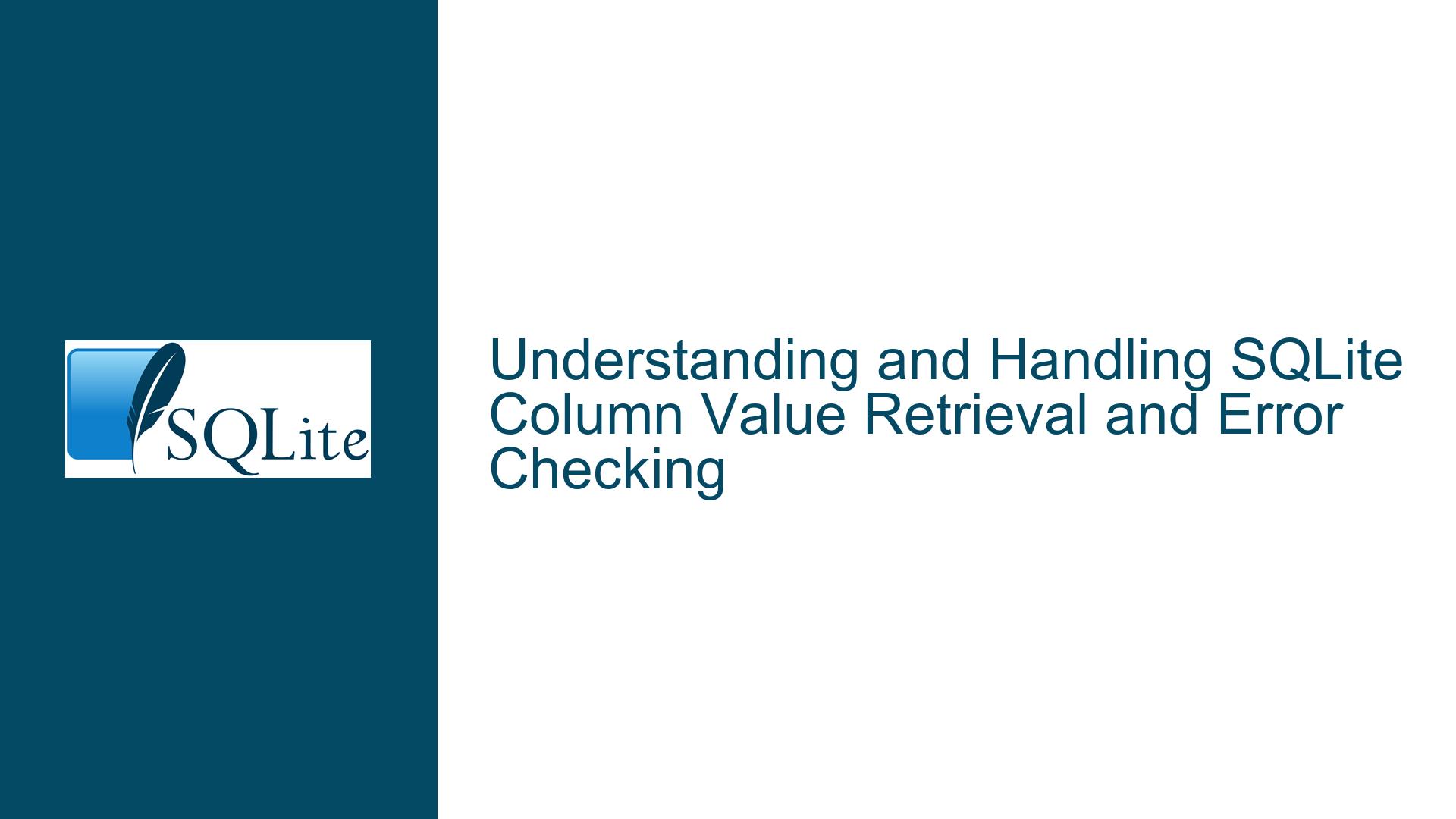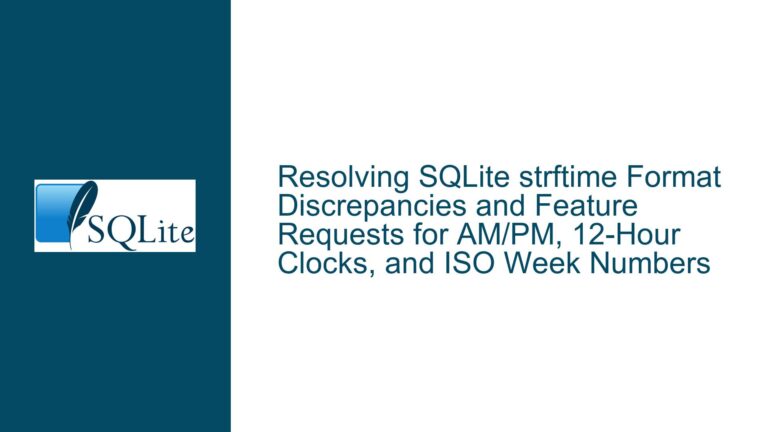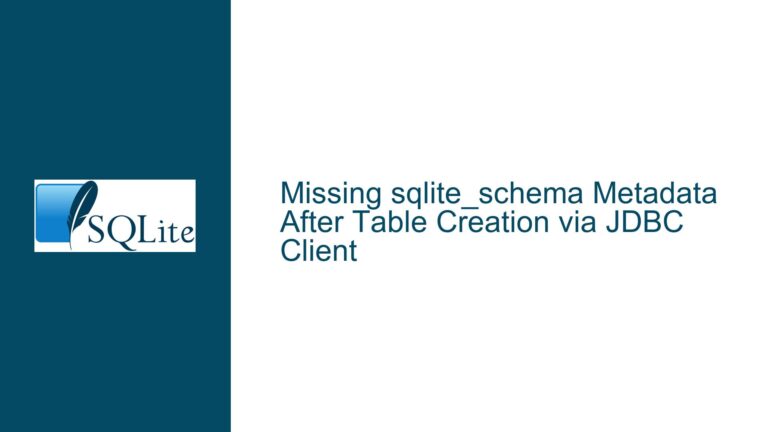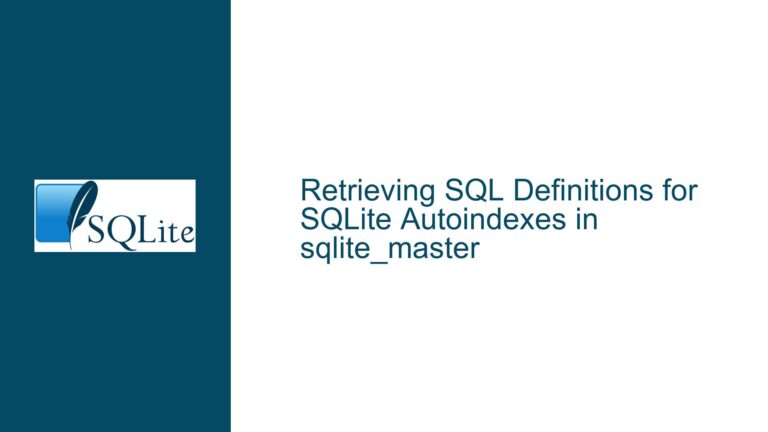and Handling SQLite Column Value Retrieval and Error Checking
SQLite Column Value Retrieval: Undefined Behavior and Error Handling
When working with SQLite, retrieving column values using functions like sqlite3_column_int, sqlite3_column_text, or sqlite3_column_blob is a common task. However, the documentation often states that these functions return "undefined" values under certain conditions. This undefined behavior can be a source of confusion, especially when it comes to error checking and ensuring the integrity of the data being retrieved. The core issue revolves around understanding what "undefined" means in this context, how to properly check for errors, and how to handle different types of column values safely.
The undefined behavior primarily arises when dealing with out-of-memory errors, type conversions, and invalid column indexes. For instance, if an out-of-memory error occurs during a format conversion, the return value from these functions will be the same as if the column had contained an SQL NULL value. This can lead to situations where a function returns a value that appears valid but is actually the result of an error condition. Additionally, improper handling of column indexes or type mismatches can result in silent truncation, overflow, or underflow, further complicating the error-checking process.
To navigate these complexities, it is essential to understand the underlying mechanisms of SQLite’s column value retrieval functions, the conditions under which they can fail, and the appropriate methods for error checking. This involves not only checking for NULL pointers or zero values but also understanding the role of sqlite3_column_type in determining the underlying storage type of a column and how to handle conversions between different data types.
Interrupted Write Operations Leading to Index Corruption
One of the primary causes of undefined behavior in SQLite column value retrieval is the potential for out-of-memory errors during format conversions. When functions like sqlite3_column_text or sqlite3_column_blob are called, they may need to perform a format conversion to return the data in the requested format. If an out-of-memory error occurs during this conversion, the function will return a value that mimics an SQL NULL. This can be particularly problematic because the error is not immediately apparent; the function does not return a NULL pointer or an explicit error code. Instead, it returns a value that looks valid but is actually the result of an error condition.
Another common cause of issues is the misuse of column indexes. If a programmer attempts to retrieve a value from an invalid column index, the behavior is undefined. In practice, SQLite may return a NULL value or a default value (such as 0 for integers), but this is not guaranteed. The documentation explicitly states that the input parameters must be correct for the functions to behave as expected. If the column index is out of range, the result is undefined, and the program may exhibit unpredictable behavior.
Type mismatches can also lead to undefined behavior. For example, calling sqlite3_column_int on a column that contains a floating-point value will result in the value being truncated to an integer. Similarly, calling sqlite3_column_double on a column that contains a large integer may result in a loss of precision. These conversions are performed silently, without any indication that data has been lost or altered. This can lead to subtle bugs that are difficult to diagnose, especially in large or complex databases.
Finally, the distinction between NULL values, empty strings, and empty blobs can also cause confusion. A NULL value is different from an empty string or an empty blob, and each requires different handling. For example, sqlite3_column_text will return a NULL pointer for a NULL value but will return a valid pointer to an empty string for an empty string. Similarly, sqlite3_column_blob will return a NULL pointer for an empty blob, but this is indistinguishable from an error condition unless additional checks are performed.
Implementing PRAGMA journal_mode and Database Backup
To effectively troubleshoot and resolve issues related to SQLite column value retrieval, it is essential to follow a systematic approach that includes proper error checking, type handling, and data validation. The first step is to always check the return value of sqlite3_step before attempting to retrieve column values. If sqlite3_step returns SQLITE_ROW, it indicates that a row of data is available, and the column values can be safely retrieved. If sqlite3_step returns any other value, it indicates an error or the end of the result set, and no further column value retrieval should be attempted.
Once a row of data is available, the next step is to determine the underlying storage type of each column using sqlite3_column_type. This function returns one of the following values: SQLITE_INTEGER, SQLITE_FLOAT, SQLITE_TEXT, SQLITE_BLOB, or SQLITE_NULL. Knowing the storage type is crucial because it determines which retrieval function should be used and whether a type conversion is necessary. For example, if sqlite3_column_type returns SQLITE_TEXT, the appropriate retrieval function is sqlite3_column_text, and no type conversion is needed. However, if the storage type is SQLITE_INTEGER and the desired type is double, a type conversion will be performed, and the potential for out-of-memory errors must be considered.
When retrieving text or blob data, it is important to check for NULL pointers. For text data, sqlite3_column_text will return a NULL pointer if the column contains a NULL value or if an out-of-memory error occurs during the conversion. However, if the column contains an empty string, sqlite3_column_text will return a valid pointer to a null-terminated empty string. Similarly, for blob data, sqlite3_column_blob will return a NULL pointer if the column contains a NULL value or if an error occurs during the conversion. However, if the column contains an empty blob, sqlite3_column_blob will also return a NULL pointer, making it impossible to distinguish between an empty blob and an error condition without additional context.
For numeric data, the situation is slightly different. Functions like sqlite3_column_int and sqlite3_column_double do not return pointers, so checking for NULL is not applicable. Instead, the focus should be on ensuring that the retrieved value is within the expected range and that no silent truncation or overflow has occurred. For example, if a column contains a large integer that exceeds the range of a 32-bit integer, calling sqlite3_column_int will result in the value being truncated to fit within 32 bits. Similarly, if a column contains a floating-point value that exceeds the precision of a double, calling sqlite3_column_double may result in a loss of precision.
To handle these issues, it is recommended to use sqlite3_column_int64 for integer values and sqlite3_column_double for floating-point values, as these functions provide greater range and precision. Additionally, after retrieving a numeric value, it is good practice to compare it against the expected range and handle any out-of-range values appropriately. For example, if a column is expected to contain positive integers, any negative values should be treated as errors.
Finally, it is important to distinguish between NULL values, empty strings, and empty blobs. A NULL value indicates the absence of data, while an empty string or empty blob indicates the presence of data with zero length. To distinguish between these cases, use sqlite3_column_type to determine the storage type and sqlite3_column_bytes or sqlite3_column_bytes16 to determine the length of the data. For text data, sqlite3_column_text will return a valid pointer to an empty string for an empty string, while sqlite3_column_blob will return a NULL pointer for an empty blob. However, as mentioned earlier, a NULL pointer from sqlite3_column_blob can also indicate an error, so additional context is needed to determine the correct interpretation.
In summary, handling SQLite column value retrieval and error checking requires a thorough understanding of the underlying mechanisms, careful attention to type handling, and systematic error checking. By following these best practices, you can ensure that your application retrieves and handles column values correctly, even in the face of undefined behavior and potential error conditions.
| Function | Return Type | Error Condition Handling |
|---|---|---|
sqlite3_column_int | int | Check for truncation or overflow; use sqlite3_column_int64 for larger integers. |
sqlite3_column_double | double | Check for loss of precision; ensure value is within expected range. |
sqlite3_column_text | const char* | Check for NULL pointer; distinguish between NULL values and empty strings. |
sqlite3_column_blob | const void* | Check for NULL pointer; distinguish between NULL values and empty blobs (context needed). |
sqlite3_column_type | int | Use to determine the underlying storage type before retrieving values. |
sqlite3_column_bytes | int | Use to determine the length of text or blob data; helps distinguish empty strings/blobs. |
By adhering to these guidelines and understanding the nuances of SQLite’s column value retrieval functions, you can avoid common pitfalls and ensure that your application handles data retrieval and error checking in a robust and reliable manner.






